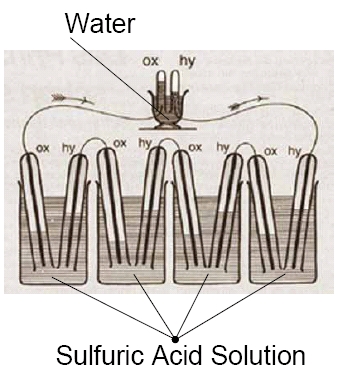 Last Wednesday, we welcomed Amanda Lyne (left), Founder and Managing Director at ULEMCo Ltd, to the Victory Lounge for our monthly discussion. Her topic was
Last Wednesday, we welcomed Amanda Lyne (left), Founder and Managing Director at ULEMCo Ltd, to the Victory Lounge for our monthly discussion. Her topic was Hydrogen and Fuel Cells - a route to low carbon energy for transport, heat and electricity
Not only is Amanda the Founder of ULEMCo Ltd, but she is also, Deputy Chair of the UK Hydrogen and Fuel Cell Association, Director of the Liverpool City Region Local Enterprise Partnership and chair of its Low Carbon Economy Committee. Amanda began by introducing herself. From an early educational background in Science, she made the transition to the commercial world through periods at ICI followed by a move to the early stage company Micap (which was one of the first Biotech ventures in Merseyside to raise funds through an IPO on AIM). This has been followed by a sustained period in the "Energy sector", hence her topic for the presentation.
 Fuel cell technology (FCT), isn't new. As Amanda pointed out it was originally proposed during the great era of Victorian Science by the Welsh Physicist and Barrister, William Grove (only in the mid 19th Century could you claim to be both!). The idea took off (literally!) during the second world war when Francis Bacon (not the early advocate of scientific method), developed the first practical fuel cell, called the alkaline fuel cell in which the input Hydrogen undergoes a redox reaction to yield electrons, followed by recombination of the protons with oxygen to produce water. The explanation at the wiki site is (in my view) a pretty good summary of Amanda's explanation of the principles underpinning the technology. However, the designs that have grown out of the original devices (notably deployed by NASA in the space shuttle) are now much more sophisticated and have been incorporated into a number of vehicles. Indeed, Amanda devoted the next part of her talk describing both the developments, the logistics and the challenges ahead for the commercial uptake of FCT.
Fuel cell technology (FCT), isn't new. As Amanda pointed out it was originally proposed during the great era of Victorian Science by the Welsh Physicist and Barrister, William Grove (only in the mid 19th Century could you claim to be both!). The idea took off (literally!) during the second world war when Francis Bacon (not the early advocate of scientific method), developed the first practical fuel cell, called the alkaline fuel cell in which the input Hydrogen undergoes a redox reaction to yield electrons, followed by recombination of the protons with oxygen to produce water. The explanation at the wiki site is (in my view) a pretty good summary of Amanda's explanation of the principles underpinning the technology. However, the designs that have grown out of the original devices (notably deployed by NASA in the space shuttle) are now much more sophisticated and have been incorporated into a number of vehicles. Indeed, Amanda devoted the next part of her talk describing both the developments, the logistics and the challenges ahead for the commercial uptake of FCT. The use of FCT (in particular hydrogen based, but Amanda did include a mention of methanol FCs, in some applications) in the automotive industry, resonated with the audience, who raised questions concerning the commercial viability (the economics and logistics) as well as the risks associated with driving around with a tank of liquid hydrogen. Amanda gave a well balanced evaluation of the comparative risks and the pros and cons of Lithium battery powered cars, such as the new Tesla (which she has taken on a test drive, to the envy of some of the audience!)
The use of FCT (in particular hydrogen based, but Amanda did include a mention of methanol FCs, in some applications) in the automotive industry, resonated with the audience, who raised questions concerning the commercial viability (the economics and logistics) as well as the risks associated with driving around with a tank of liquid hydrogen. Amanda gave a well balanced evaluation of the comparative risks and the pros and cons of Lithium battery powered cars, such as the new Tesla (which she has taken on a test drive, to the envy of some of the audience!)
Amanda finished the talk with examples of FTC in action today, which was reinforced by images of not only vehicles, but examples of marine and a range of industrial applications, as well as her company's long term approach to providing sustainable solutions for more widespread introduction of the technology alone or as a hybrid solution. This led to a long and interesting discussion relating to the politics and economics, as well as the practicalities of fuelling stations etc. On the whole, it provided an engaged and audience (as always at the Widnes SciBar) with plenty to think about as we try to come to terms with managing the global challenges of sustainable energy supply and consumption.
 Thanks Amanda, the Friends of Catalyst and everyone who made it to the Hillcrest, for making it another enjoyable and stimulating meeting!
Thanks Amanda, the Friends of Catalyst and everyone who made it to the Hillcrest, for making it another enjoyable and stimulating meeting!Bob will be circulating further details of next month's talk, which takes us to the challenges facing the scientists exploring the frozen southern oceans! Fitting for this time of the year!